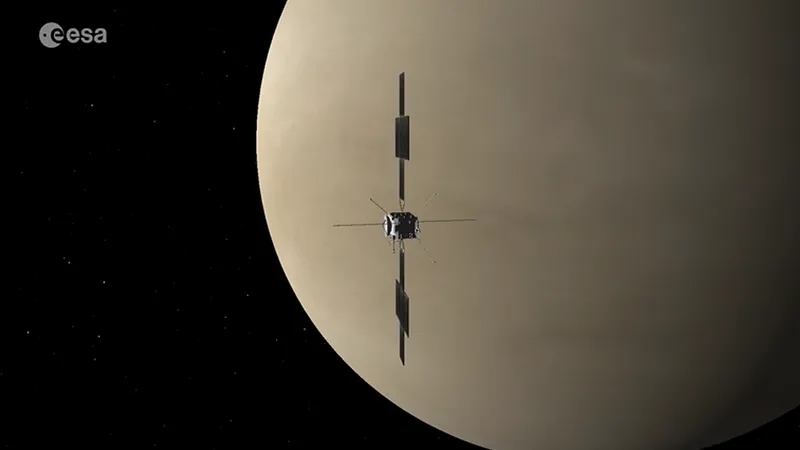
Europe's JUICE Probe Is Back on Track for a Crucial Venus Encounter!
2025-08-26
Author: Mei
A Close Call for JUICE
Europe's latest interplanetary marvel, the JUICE probe, recently faced a tense situation, losing contact with Earth for nearly a day just ahead of its vital Venus flyby scheduled for August 31. Launched by the European Space Agency (ESA) aboard an Ariane 5 rocket from French Guiana in April 2023, JUICE is en route to the Jupiter system, where it will explore the gas giant and its three major moons: Ganymede, Callisto, and Europa.
Countdown to the Venus Flyby
The JUICE probe, short for "Jupiter Icy Moons Explorer," is set to make its grand arrival at Jupiter in July 2031, utilizing four gravity-assist flybys to accelerate its journey toward the outer solar system. The spacecraft's upcoming encounter with Venus marks its second flyby before heading deeper into space.
Communication Crisis Averted
On July 16, a routine communication with the deep space antenna in Cebreros, Spain, failed, plunging mission operators into uncertainty. The inability to confirm JUICE’s telemetry forced engineers to act swiftly, as time was ticking down to the Venus encounter.
High Stakes and Quick Thinking
"Losing contact with a spacecraft is one of the most serious scenarios we can face," stated Angela Dietz, JUICE's Spacecraft Operations Manager. Engineers quickly eliminated issues with ground communications and narrowed down potential causes to a misalignment of JUICE's medium-gain antenna or a malfunction in its communications amplifier.
On the Edge of Safe Mode
In a critical moment, mission managers worried that JUICE might have entered a protective safe mode. With the Venus flyby looming, they had to make a decision: either send commands to JUICE blindly or wait two weeks for it to reset automatically—an option deemed risky.
A Successful Recovery
In an impressive display of teamwork, operators managed to realign JUICE's antenna after six attempts over 20 tense hours, reestablishing communication and confirming the spacecraft’s good health. A glitch in JUICE's timing software had caused the issue, but a fix was quickly implemented to prevent future recurrence.
The Countdown Resumes!
With communications restored, preparations for the pivotal Venus flyby were back on schedule. JUICE is expected to reach its closest point to Venus at 1:28 a.m. EDT on Sunday. This flyby is not just a fascinating maneuver but will help JUICE gain momentum for its next significant event in September 2026, a fast loop around Earth.
The Great Quest Unfolds
JUICE's journey doesn’t end there. Following its first gravity assist from Earth and the Moon in August 2024, another flyby is planned for January 2029—ultimately gearing up for its rendezvous with Jupiter in 2031. The mission aims to uncover signs of life in the oceans believed to exist beneath the icy surfaces of Ganymede, Callisto, and Europa. If successful, JUICE will spend approximately 2.5 years orbiting Jupiter, making 35 passes of its moons. At mission's end, JUICE will alter its path to become the first spacecraft to orbit Ganymede.
History in the Making
As it stands, the JUICE mission could usher in a new era of extraterrestrial exploration, offering unprecedented insights into the potential for life beyond Earth. Stay tuned as this thrilling mission unfolds!


 Brasil (PT)
Brasil (PT)
 Canada (EN)
Canada (EN)
 Chile (ES)
Chile (ES)
 Česko (CS)
Česko (CS)
 대한민국 (KO)
대한민국 (KO)
 España (ES)
España (ES)
 France (FR)
France (FR)
 Hong Kong (EN)
Hong Kong (EN)
 Italia (IT)
Italia (IT)
 日本 (JA)
日本 (JA)
 Magyarország (HU)
Magyarország (HU)
 Norge (NO)
Norge (NO)
 Polska (PL)
Polska (PL)
 Schweiz (DE)
Schweiz (DE)
 Singapore (EN)
Singapore (EN)
 Sverige (SV)
Sverige (SV)
 Suomi (FI)
Suomi (FI)
 Türkiye (TR)
Türkiye (TR)
 الإمارات العربية المتحدة (AR)
الإمارات العربية المتحدة (AR)